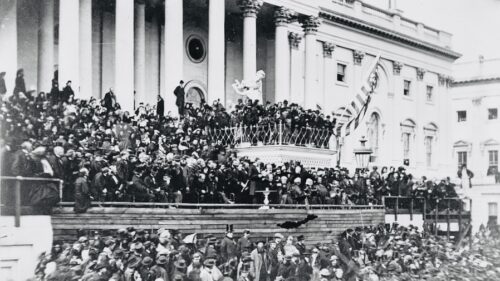
The Second Inaugural Address

By: David Tucker
Facing re-election in 1864, Lincoln was not certain of winning. The Republicans had suffered serious losses in the 1862 mid-term election, due to failures in the war, inflation from the high cost of fighting it, and rumors of corruption among those provisioning the troops. The preliminary Emancipation Proclamation (September 22, 1862) had also cost Lincoln some support. Despite Union victories at Gettysburg and Vicksburg in the summer of 1863, in 1864 the war continued with high casualties and no end in sight. Lincoln faced opposition from Democrats, many of whom wanted the war, rather than slavery, to end. George McClellan, a popular general, whom Lincoln had dismissed for not waging the war aggressively, was the Democratic candidate. Lincoln also faced opposition from radical Republicans who thought Lincoln’s post-war plans too conciliatory to the South. As late as August, 1864, Lincoln could write
This morning, as for some days past, it seems exceedingly probable that this Administration will not be re-elected. Then it will be my duty to so co-operate with the President elect, as to save the Union between the election and the inauguration; as he will have secured his election on such ground that he cannot possibly save it afterward.
But earlier in August, Admiral Farragut had captured the port of Mobile, Alabama, decisively tightening the blockade of the Confederacy. Then in early September, General Sherman’s armies captured Atlanta. With prospects for Union victory improving, and Lincoln’s political skill and patronage neutralizing threats inside the Republican party, Lincoln was re-elected in a landslide, receiving overwhelming support from Union soldiers.
By the time of Lincoln’s second inauguration, Grant’s relentless attacks on Lee’s Army, which was protecting the Confederate capital of Richmond, Virginia, had battered it beyond recovery. It was clear that the war would soon end in a Union victory. Attention increasingly turned from the war to its aftermath. As Lincoln made clear in the opening paragraphs of his Inaugural Address, he did not intend to comment on the different proposals for how to deal with the southern states and restore the full authority of the Union. He offered instead a meditation on the place of the war, and in that way on the place of America, within God’s providence. Lincoln’s purpose was to provide Americans the proper vantage point for viewing the terrible war they had fought, that they might understand their shared responsibility for it as they set about to heal the nation’s wounds.
In the Temperance Address delivered twenty-two years before, Lincoln had pointed to the harm that would come from pursuing social reform on the assumption that the reformers were morally superior to those they sought to reform. The lack of sympathy and fellow feeling in such an effort defied human nature and contravened the teachings of Christianity. It diminished the likelihood of the reform succeeding, instead creating divisions among fellow citizens. The attitude that Lincoln had criticized in the Temperance Address, insofar as it informed the abolitionist movement, had contributed to the outbreak of the Civil War just as much as southern pride and intransigence had. Lincoln’s Second Inaugural picked up the theme of the Temperance Address in again calling for reconciliation among American citizens. With its numerous references to the Bible, the Second Inaugural moved beyond the rational and natural causes to which Lincoln generally confined himself in speeches given early in his career, like the Lyceum Speech and the Temperance Address. Now, he appealed to God’s transcendent justice as the source of the charity among Americans necessary to bind the nation’s wounds. If we leave judgment, certainly final judgment, to God, then we are left with the admonition to have malice toward none, and charity for all.
Grant took Richmond a month after Lincoln delivered his second Inaugural Address. A week later, on April 9, Lee surrendered to Grant, effectively ending the war. On April 14, the same day that Union forces reoccupied Fort Sumter, bringing the war full circle, Lincoln was assassinated.
To read Lincoln’s Second Inaugural Address Click Here
| Previous Essay | Home | Next Essay |
